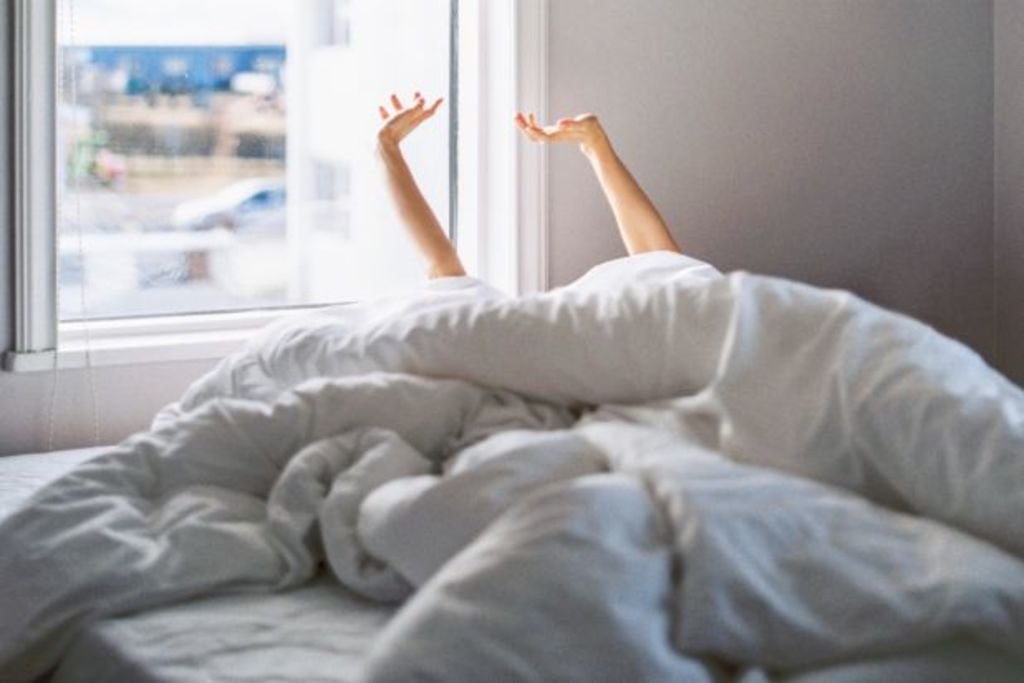Is sleeping in bad for you? Social jetlag and the science of sleep

Have you ever spent a weekend staying up late, sleeping in, and then struggled to make it into work on Monday morning? Perhaps you’ve shared a joke about “Mondayitis” with fellow bleary-eyed workers queuing up for a coffee fix at the local cafe?
If you’ve ever arrived at work feeling as though you’ve just disembarked from a long-haul flight, you’re probably in the grips of a phenomenon known as “social jetlag”.
“Social jetlag is the difference in your sleep timing between your work days and your free days. Lots of people effectively live in a different time zone on weekends from work days,” says Dr Andrew Phillips, sleep expert at the Monash Institute of Cognitive and Clinical Neurosciences.
During the week most people use alarm clocks to enable them to wake up early for work, and often get insufficient sleep. On weekends people are free to both stay up late and sleep in to make up for that lost sleep. Rather than returning to work well rested on a Monday morning, what results is a mismatch of timing that sends the bodyclock haywire.
“It’s called social jetlag because it’s very reminiscent of the lack of synchronisation of bodily rhythms that occurs during actual jetlag when you travel across time zones,” Dr Phillips says.
Sleep science is gaining increasing recognition, and with it comes a growing understanding of the role sleep plays in health and wellbeing. In fact, sleep is now recognised as one of the three pillars of good health, alongside diet and exercise.
Despite this, a 2016 study by the Sleep Health Foundation showed that Australia is in the grip of a “sleep deprivation epidemic”, with our chronic lack of sleep linked to myriad health, social and economic issues.
 Should we be setting alarm clocks on weekends too? Photo: Stocksy
Should we be setting alarm clocks on weekends too? Photo: Stocksy
According to the report, 33-45 per cent of Australian adults are affected by inadequate sleep. Research shows that cutting corners when it comes to shut-eye is a costly choice, and one that has a detrimental effect on physical and mental health. For example, getting an average of less than six to seven hours of sleep per night can increase the risk of diseases including obesity, type 2 diabetes, heart disease, and hypertension.
- Related: How to give your bedroom a ‘sleep makeover’
- Related: Keep your bedroom cool on hot summer nights
- Related: Having trouble sleeping? It could be your decor
“What we’re seeing at this point is that sleep doesn’t have one single function. It’s of value of to every system in the body,” Dr Phillips says.
“So really, it’s not a very clever sacrifice in the long term to be giving up your sleep, and thereby reducing your quality of functioning during wakefulness as well as affecting your long-term health outcomes.”
Poor sleep also wreaks havoc on circadian rhythms, the body’s way of keeping time.
“Virtually every cell in our body contains its own clock that is capable of keeping time. This allows all the different processes in our body to remain properly synced with each other,” Dr Phillips says.
Circadian rhythms are also highly sensitive to light, which means it’s crucial to limit screen time and light exposure in the hours leading up to bedtime. However, in a society with long working hours coupled with a plethora of night-time activities, our circadian rhythms are under increased pressure.
 Is a lazy sleep-in on the weekend really a wise choice? Photo: Stocksy
Is a lazy sleep-in on the weekend really a wise choice? Photo: Stocksy
So, if you’re exhausted after a big week is having a lazy sleep-in on the weekend really a wise choice?
“There is an answer, and repaying sleep debt is important, but it shouldn’t be done to the neglect of circadian rhythms,” Dr Phillips says.
“It is important to keep similar morning wake times on weekdays and free days. You can’t just treat your weekends and work days as independent of one another – there will come a cost, which you will particularly feel on Monday,” he says.
But what about the night owls? Dr Fiona Kerr, specialist at the University of Adelaide Neural & Systems Complexity, suggests following the lead of France or Spain and power napping during the day.
“Naps are really critical because we are actually biphasic animals,” she says. “We have two sleep cycles: one is around seven hours and the other one is either 30 minutes if you just want to increase alertness, capacity, working memory, logical reasoning and motor dexterity … or if you need to go into REM sleep, around 90 minutes.”
It’s important to decide upon the length of your nap, however, as naps that last between 30 to 60 minutes can be counterproductive.
“Your frontal lobe is shutting down because it’s expecting to go into a full REM cycle, so you might wake and have a horrible headache,” Dr Kerr says.
So, are we finally waking up to the importance of sleep? Professor Dorothy Bruck, chair of The Sleep Health Foundation, is optimistic.
“I think there’s a growing awareness that sleep is cool, and that people need to get regular hours and enough sleep so that they can function optimally and not just drag themselves through the day, and also have optimum mental health,” she says.
We recommend
States
Capital Cities
Capital Cities - Rentals
Popular Areas
Allhomes
More







